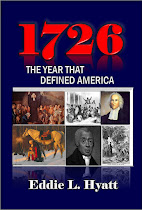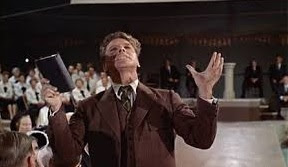I read with interest Dr. Michael Brown’s commentary on Brady 'Phanatik' Goodwin’s announcement that he was renouncing
his Christian faith. What caught my eye was
the impersonal and sterile nature of the faith he was renouncing. In explaining
his decision, Goodwin said,
I sent a letter to my church withdrawing my membership and
saying that I am denouncing the Christian faith that I have believed,
professed, proclaimed and defended for the last 30 years of my life.
My heart goes out to Mr. Goodwin, but it sounds
as though his Christianity was rooted in externals such as church membership
and a set of doctrinal beliefs that he has “defended” for much of his life.
There is little indication of a warm and personal heart relationship with
Christ.
By contrast, when we read the words of the
early martyrs of the Church, it is obvious they were not laying down their lives
for an institution or set of doctrines. Their testimonies are warm and passionate
concerning their love and commitment to Christ.
For example, Polycarp (ca. 69-155), pastor/bishop
of Philippi, was martyred for his faith late in life. Brought before the
pagan proconsul of the region and given the option of renouncing Christ or
being burned alive, Polycarp passionately replied,
For eighty-six years I have been His servant, and He has done me
no wrong. How can I blaspheme my King who saved me?
Polycarp obviously did not see himself dying
for a mere set of doctrines. It was a Person he was representing, and this
Person meant everything to him. This is not to downplay the importance of
doctrine, but to remind us that it is a Person that saves us, not a doctrine.
John Wesley discovered this in a very dramatic
fashion. He was ordained as a minister in the Anglican Church and even went to
Georgia as a missionary; but according to his own testimony he was a Christian in name only, for his faith was in
the external forms of Christianity and not Christ Himself. This all changed
when he visited a Moravian society where someone was reading Martin Luther’s
Preface to Romans.
As Wesley listened to how Luther described the
change that comes when a person puts their faith in Christ and Him alone, he
had a life-changing experience that he considered to be the time of his
conversion. He wrote,
I felt my heart strangely warmed. I felt that
I did trust in Christ, Christ alone for my salvation and an assurance was given
me that He had taken away my sin, even mine, and saved me from the law of sin
and death.
Wesley was never the same. After this
conversion experience, he spearheaded the great Methodist Revival that
transformed the British Isles and impacted the Church around the world. He insisited on a real heart conversion to Christ and in his Journal dated June 10, 1741, he wrote,
I preached in the morning on the inward kingdom of God. And many, I trust,
found they were Heathens in heart, and Christians in name only.
I am not suggesting that Goodwin was not truly
saved. Only God knows the heart. His words, nonetheless, remind me, not only of
Wesley’s experience, but also that of Pandita Ramabai (1855-1922), a remarkable Christian woman
whose life was transformed when she came to the realization that she too was a
Christian in name only.
Pandita was reared in a devout Hindu home in India but
decided to convert to Christianity as a young woman while studying in England.
She, therefore, joined the Church of England, was baptized, and began studying
to defend her new religion to family and friends.
But two years after her conversion, Pandita came
to the realization that she had, as she put it, merely “changed religions.” Her
faith was in the external formalities of Christianity, not the Person of
Christ. She realized she was a Christian in name only.
She bowed before the Lord and gave herself completely
up to Him. Her life was revolutionized as she experienced the new birth of
which Jesus spoke. Her faith was now in Christ Himself, and it was very
personal, heart-felt, and dynamic.
In 1905 she began a prayer meeting with the
500 residents of the orphanage she had founded. She announced that the purpose of
the prayer meeting was to pray for the conversion, not of the Hindus or the Muslims,
but of all the Christians in India.
She realized from her own experience that many
who called themselves Christians had only a superficial faith based on the outward
formalities of Christianity. Their faith was in church membership, or the fact
they had once been baptized, or the fact they attended church. Their faith was
not in Christ Himself.
Out of this prayer meeting, a great revival was ignited that spread throughout India. Multitudes of “Christians” encountered the living Christ, and their lives were transformed. Empowered by the Holy Spirit, young orphan girls went out preaching the Gospel in the surrounding Indian villages.
The revival attracted visitors from far and near,
including American missionaries who were in awe of what they observed. So great was Pandita's social impact that in 1989 the Indian government issued a postage stamp in her honor with her picture.
If Goodwin’s faith was like that of Wesley’s
or Pandita’s before their conversion, I pray that he will turn to Jesus with
all his heart and come to know Him in a real and personal way. This is what
Christianity is all about, for Jesus Himself said in John 17:3, And this is
eternal life, that they may know You, the only true God, and Jesus Christ whom
You have sent.
I think it is safe to say that our nation is filled with those who are “Christian” in name only. Perhaps we would do well to pray for their conversion. When
such nominal (name only) Christians awaken to their condition and turn to Jesus
with all their hearts, the Church comes alive and becomes a transformative
force in society.
It happened with Wesley in 18th century
England and with Pandita in 20th century India and it can happen with us in 21st century America.
Dr. Eddie Hyatt is a Bible teacher, author and revivalist. His books, America's Revival Heritage and 1726: The Year that Defined America, undermine the modern "woke" secularist revision of American history by documenting how the 18th century Great Awakening had a direct bearing on both the founding of America and the ending of slavery on this contienent.











